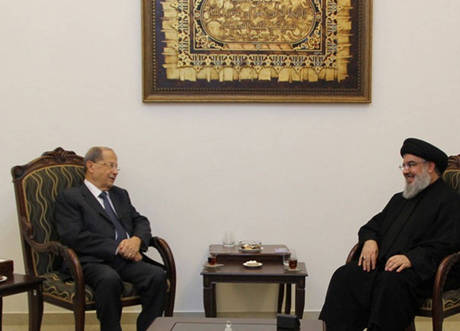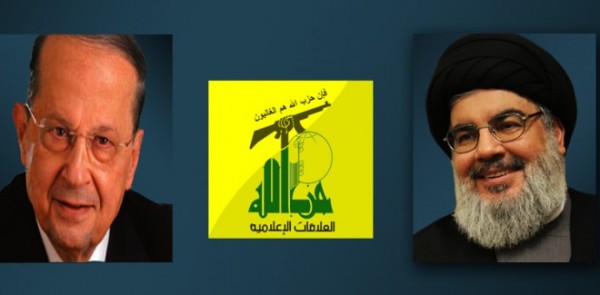The US Treasury on Tuesday announced it was imposing sanctions on former finance minister and top Amal official Ali Hassan Khalil and former public works and transportation minister Youssef Fenianos, a senior member of the Christian Marada Movement because they “provided material support to Hezbollah and engaged in corruption.” The move was Washington strongest warning against Hezbollah’s allies. President Michel Aoun who signed a memorandum of understanding with Hezbollah back in 2006 when he was serving as the Free patriotic Movement leader and who remained as a key ally of Hezbollah appears to be concerned about the US sanctions specially because another list is coming next week with new names

BEIRUT: Lebanon’s President Michel Aoun has asked his interim foreign minister to contact the US embassy about the imposition of sanctions on two of the country’s former ministers, the presidency media office said on Wednesday.
Aoun also requested contact be made with the Lebanese embassy in Washington “in order to understand the circumstances” behind the decision to place the politicians, allied with the Shiite Muslim group Hezbollah, on its sanctions list.
The US Treasury on Tuesday announced it was imposing sanctions on former finance minister and top Amal official Ali Hassan Khalil and former public works and transportation minister Youssef Fenianos, a senior member of the Christian Marada Movement.
The treasury department said they “provided material support to Hezbollah and engaged in corruption.” The move was Washington strongest warning against Hezbollah’s allies.
Khalil is currently a member of the Lebanese Parliament and Hezbollah and its allies control majority seats in parliament.
The Shiite Amal group is headed by Lebanon’s longtime Parliament Speaker Nabih Berri and the Marada Movement is an organization allied with Hezbollah and Syrian President Bashar Assad’s government.
The sanctions came as Lebanon grapples with an unprecedented economic and financial crisis and deals with the aftermath of a devastating explosion at Beirut’s port that killed more than 190, wounded 6,500 and caused damage worth billions of dollars.
The sanctions also came as prime minister-designate Mustapha Adib works to form a new Cabinet to replace the one that resigned on Aug. 10, six days after nearly 3,000 tons of ammonium nitrate detonated in Beirut. The disaster fueled outrage against a ruling class that has run the country for decades amid widespread corruption and mismanagement.
Some analysts in Lebanon saw the sanctions as a message to Hezbollah’s allies to review their links with the Iran-backed group, especially by targeting a Christian ally for the first time.
“Fenianos and Ali Hassan Khalil are two central figures in the coalition that is led by Hezbollah,” said Ali Hamadeh, a political writer at An-Nahar newspaper who is often critical of the Iran-backed group.
He added that by sanctioning Fenianos, the US is sending a message to Frangieh, the Marada chief, who is a presidential hopeful. Hamadeh said Hezbollah’s non-Shiite allies will now have to “think seriously about the repercussions of their relations with Hezbollah.”
Amal denounced the US sanctions against one of its senior members in a statement on Wednesday, saying they infringe on Lebanon’s sovereignty and will not succeed in extracting any concessions.
According to David Schenker, Assistant Secretary Bureau of Near Eastern Affairs, the US will impose sanctions against more people who are allied with Hezbollah and the list of the people will be announced next week
(Arab News / Reuters / AP


Leave a Reply
You must be logged in to post a comment.